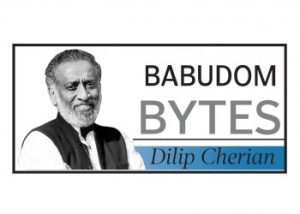Gujarat’s Cyberwar Dilip Cherian Updated: September 2nd, 2023, 07:30 IST in Edit 0 Share on Facebook Share on Twitter Share on WhatsApp Share on Linkedin I n Gujarat, a disconcerting phenomenon is taking root – the rapid proliferation of social media impersonations targeting notable figures, including IAS, IPS officials and medical professionals. These malevolent imposters exploit the easily accessible civil lists of IAS and IPS officers, ingeniously creating counterfeit profiles complete with genuine images. Stories abound of scam artists using these fake profiles to solicit funds for fictional medical emergencies, tugging at the heartstrings of those genuinely wishing to help.
From eminent senior bureaucrats to dedicated doctors on the frontlines, the impact spans sectors. The state cybercrime unit has reportedly confirmed the thwarting of over 53 counterfeit accounts, underscoring the severity of the issue. Among those who have fallen victim to this ruse is former Chief Secretary and 1986-batch IAS officer Pankaj Kumar.
Additionally, Rajiv Kumar Gupta of the Gujarat Mineral Development Corporation and Bhargavi Dave from the Gujarat State Human Rights Commission have had their social media accounts duplicated. It is believed that since the civil lists of IAS and IPS officials are available online, scammers target popular accounts using original pictures to create fake ones. Gujarat’s struggle echoes the fight against digital malfeasance in other states as well.
The fortification of our virtual domain requires the collaborative efforts of bureaucrats, policymakers and citizens. Among the first things to do is the urgent need for widespread public awareness campaigns to educate individuals about the perils of online impersonation. In tandem, digital platforms must come up with innovative solutions to secure public data, stemming the misuse of available information.
A new body to supersede CBI and ED ! The idea of introducing a Chief Investigating Officer (CIO) akin to the Chief of Defence Staff (CDS) and the National Security Advisor (NSA) has resurfaced, capturing the attention of Dilli’s elite echelons. The recent spotlight on the outgoing Chief of the Enforcement Directorate (ED) S. K.
Mishra has rejuvenated discussions around the concept of a CIO. This, no doubt, is fuelled by the Centre’s curious unwavering faith in Mishra’s capabilities, transforming the discourse into a litmus test of the Centre’s authority and resilience, crucially, ahead of the impending Lok Sabha polls in 2024. If actualized, Mishra’s legacy will be etched as the nation’s first CIO, overseeing agencies such as the Central Bureau of Investigation (CBI) and Enforcement Directorate (ED), paralleling the structure of the CDS and NSA.
The recent scrutiny by the Supreme Court over Mishra’s extensions signals the government’s quest for comprehensive control over such appointments. Notably, the government perceives a CIO’s role as instrumental in fostering synergies among key investigative agencies. This envisaged role would have the rank of a secretary.
Clearly, anticipated to be instituted prior to Mishra’s departure on September 15, 2023, this new position is set to coexist with the ED operating within the Department of Revenue under the Ministry of Finance, and the CBI operating under the Ministry of Personnel, Public Grievances and Pensions. However, this development could potentially dilute the position of the CBI director. Earlier, the procedure for the CBI director’s appointment was instituted to prevent its misuse, but with the creation of the new post that would also become redundant.
Some senior officials believe that in such a situation, the matter may once again bring the Supreme Court’s intervention. They also fear that the CBI may lose its status, while that of the ED and IT departments will rise. The issue, therefore, resonates far beyond the mere restructuring of bureaucratic roles.
Babu’s suspension underscores Manipur’s complex realities The unprecedented suspension of senior IAS officer Ng Roben Singh has sent ripples through the administrative circles, shedding light on the intricate challenges faced in Manipur. Singh refused to assume the role of deputy commissioner of Jiribam district, citing safety concerns amid ethnic tensions in the state. Under the invocation of Rule 3 of the All India Service (Discipline & Appeal) Rules, 1969, Manipur’s Chief Secretary Vineet Joshi suspended the IAS officer with immediate effect.
Singh’s decision to challenge his transfer order brought to a head his apprehensions about working in areas dominated by the Kuki community, underlining the vulnerabilities faced by Meitei officers like himself. While pointing out the frequent transfers he had undergone in the past, he had also reportedly expressed willingness to serve as deputy commissioner in the districts most affected by communal violence in the valley. This episode underscores the complex interplay of safety concerns, ethnic dynamics, and the state administration in Manipur, revealing a multi-faceted reality that demands careful consideration and nuanced solutions.
Share a babu experience! Follow [email protected] . Let’s multiply the effect Tags: Babudom Bytes Dilip Cherian Share Tweet Send Share Suggest A Correction Enter your email to get our daily news in your inbox. Leave this field empty if you’re human: Related Posts Two Indias August 30, 2023 Thai Democracy August 29, 2023 Prigozhin & Putin August 28, 2023 Science For Humanity August 27, 2023 Pen To Podium August 26, 2023 China In Soup August 23, 2023 Leave a Reply Cancel reply Your email address will not be published.
Required fields are marked * Comment * Name * Email * Website Save my name, email, and website in this browser for the next time I comment. Δ.
From: orissapost
URL: https://www.orissapost.com/gujarats-cyberwar/
